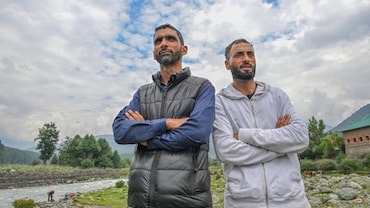The Bedside Guardian: Ketaki Kale Provides Care, Hope And Support To Those Suffering From Coronavirus
“During their hospital stay, they form bonds with us and we become their families away from home,” Ketaki Kale points out. “Our patients come first, before anything else,” she adds
 Illustration by Keshav Kapil
Illustration by Keshav Kapil
When Ketaki Kale, 33, took the Florence Nightingale oath to start her career as a nurse almost nine years ago, it was impossible for her to imagine she would be sent off to the front line to battle a pandemic that would bring the entire globe to its knees. Kale trembled within, as she broke the news to her family—she had been deputed to the COVID-19 ward at Naidu Hospital, Pune.
Kale’s mother-in-law, a retired nurse, who inspired Ketaki to take up nursing, reminded her of the spirit of service that nurses must be committed to. “You go,” she said, “I will look after the kids,” Kale tells us.
Under her care were 15 COVID patients, mostly in their mid-30s, as well as some senior citizens, who needed special attention. Even though there were no “serious patients” to begin with, a tense environment prevailed in the ward. The mood eased up as admissions spiked.
COVID-19 patients are separated from each other—there is a gap of 10 feet between each bed—wrapped in PPE, they are not allowed any visitors. “Since they are lonely and worried, they tend to share their feelings and anxieties with us,” says Kale. There are also frequent questions from the troubled patients: “Will we be alright?” they keep asking the staff.
Kale speaks with warmth about patients who wait for the ‘sisters’ to arrive every morning. “During their hospital stay, they form bonds with us and we become their families away from home,” she points out. But the hospital staff is obviously happiest when they are able to send the patients home after they recover.
In fact, in the weeks gone by, they have received patients with serious complications—one of them, an 85-year-old lady, passed away about a month ago. “I got a call at home that she had died. She had been with us for 14 days,” says Kale. This incident has, obviously, cast a shadow in Kale’s section of the ward. The ‘sisters’ keep their chins up, regardless, and make sure other patients are not affected, cheering them with a kind word or a joke, whenever possible. But they have a ton of duties they need to focus on: administering medicines and injections to patients, helping them with meals, changing, cleaning and talking to them. Serving the doctors, who come on regular rounds, with patient updates is also a crucial task.
Of course, the entire hospital staff is secured with PPEs. There are strict hygiene protocols to be followed at every stage—before entering the ward and leaving it. Every day, after their eight-hour shift is over, Kale returns home and has another bath, and sanitizes herself multiple times. “I am concerned about my boys (Prathamesh, 11 and Harshal, 9),” says Kale. She spends time with them, and immerses herself in domestic duties, depending on whether it is a day or night shift. Kale’s husband, Ganesh, who works with the electricity board in Pune, pitches in with the housework and looks after their sons.
“No matter how careful you are, the risk remains,” says Kale, who tries to fight back moments of fear and uncertainty. However, being on the front-line, and battling the disease, has made her resilient and even more committed. “Our patients come first, before anything else,” she says.
Stop press: Kale, while riding to her night duty was knocked down on her two-wheeler, by a speeding car. She arrived at the hospital, did a full night’s duty and only then got herself admitted to a hospital the next day, where she is recuperating now.






